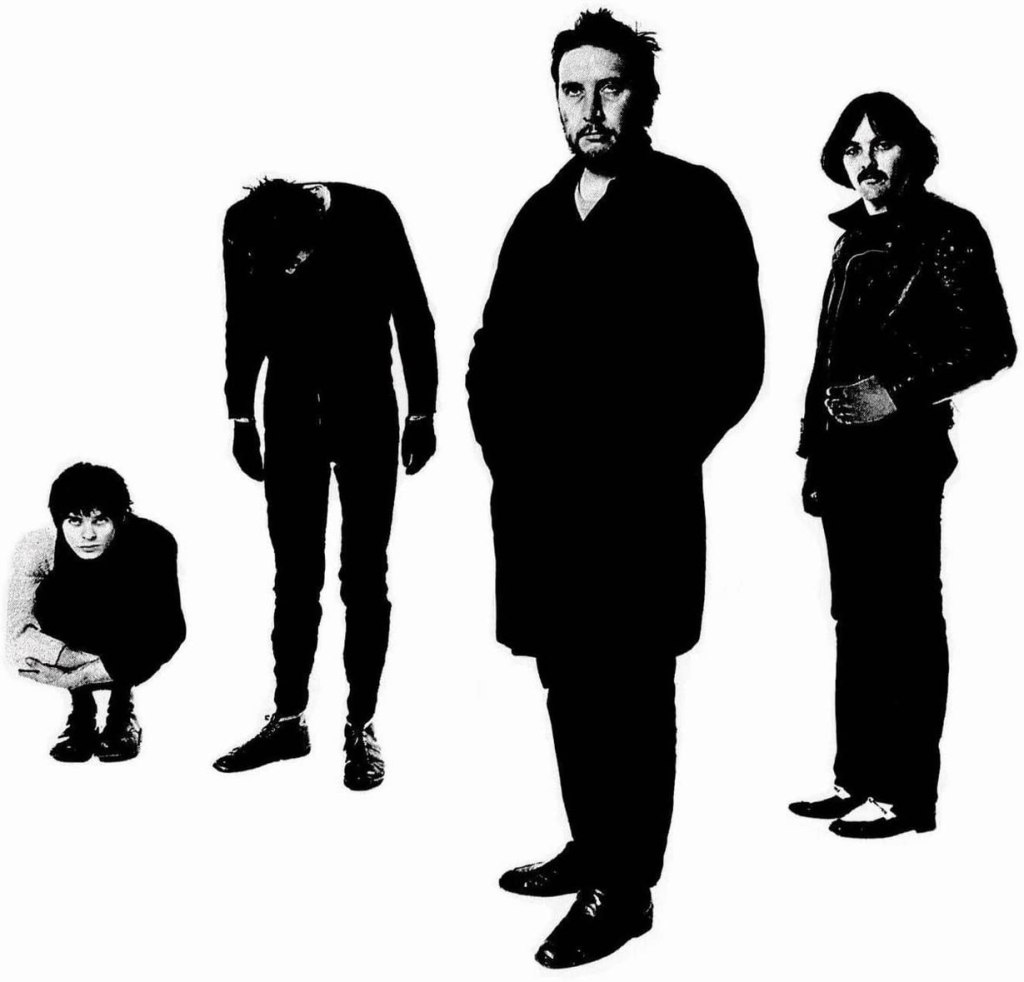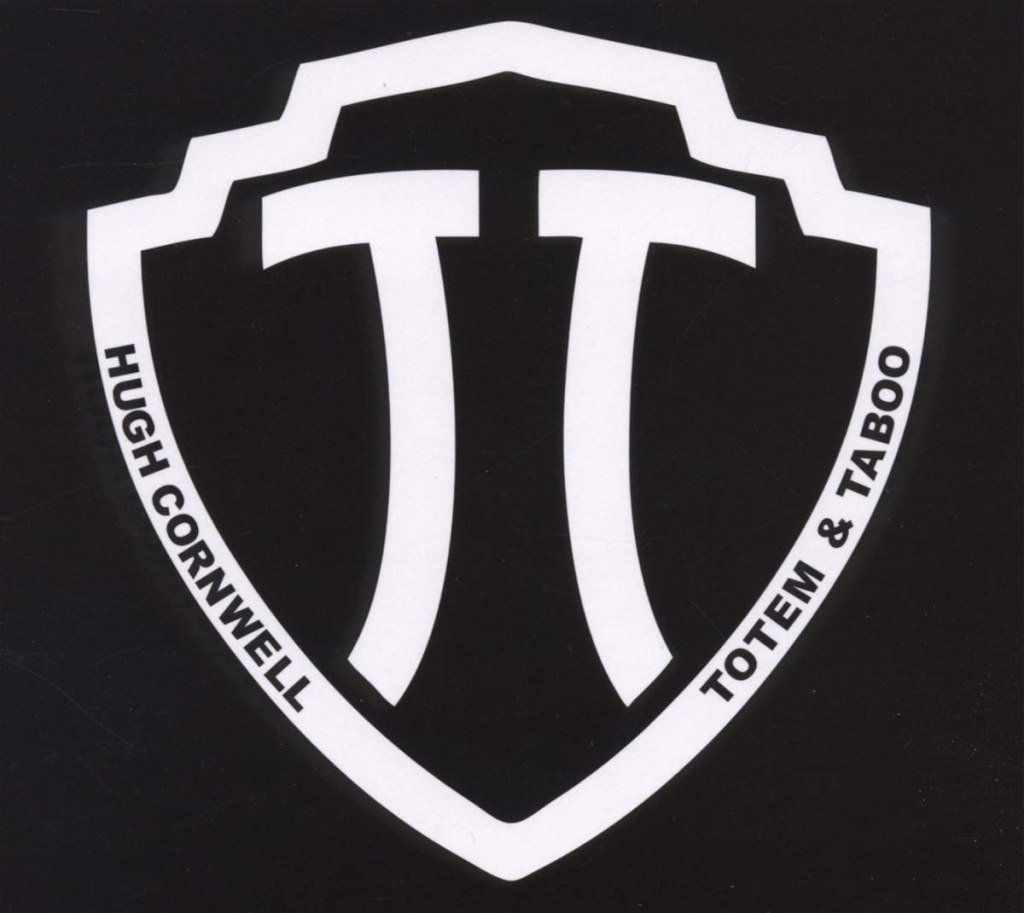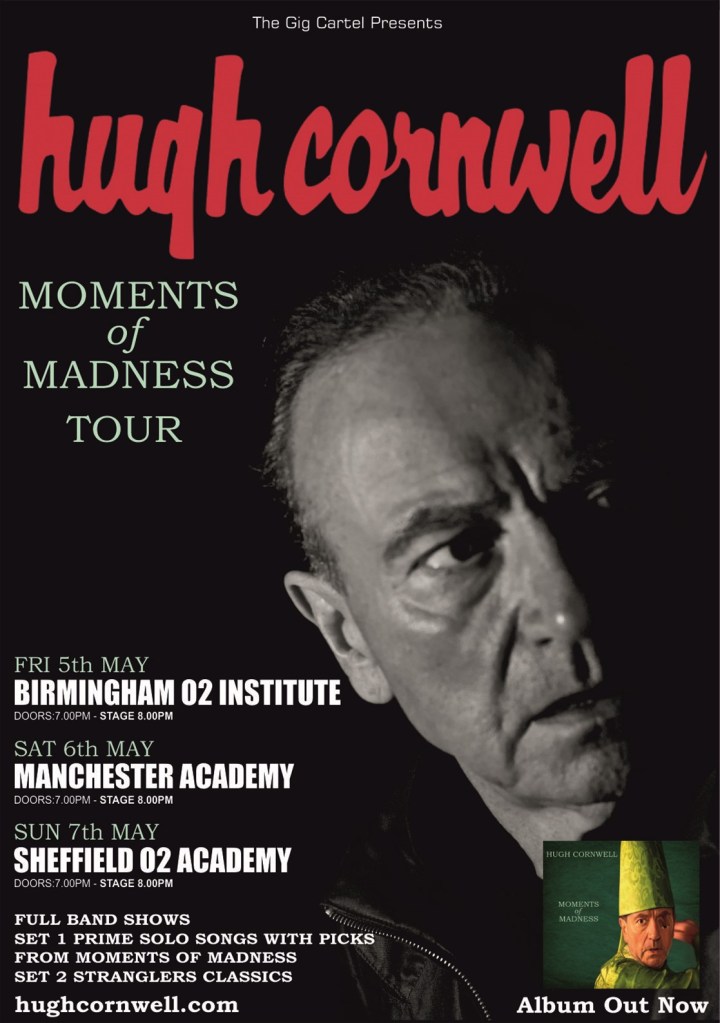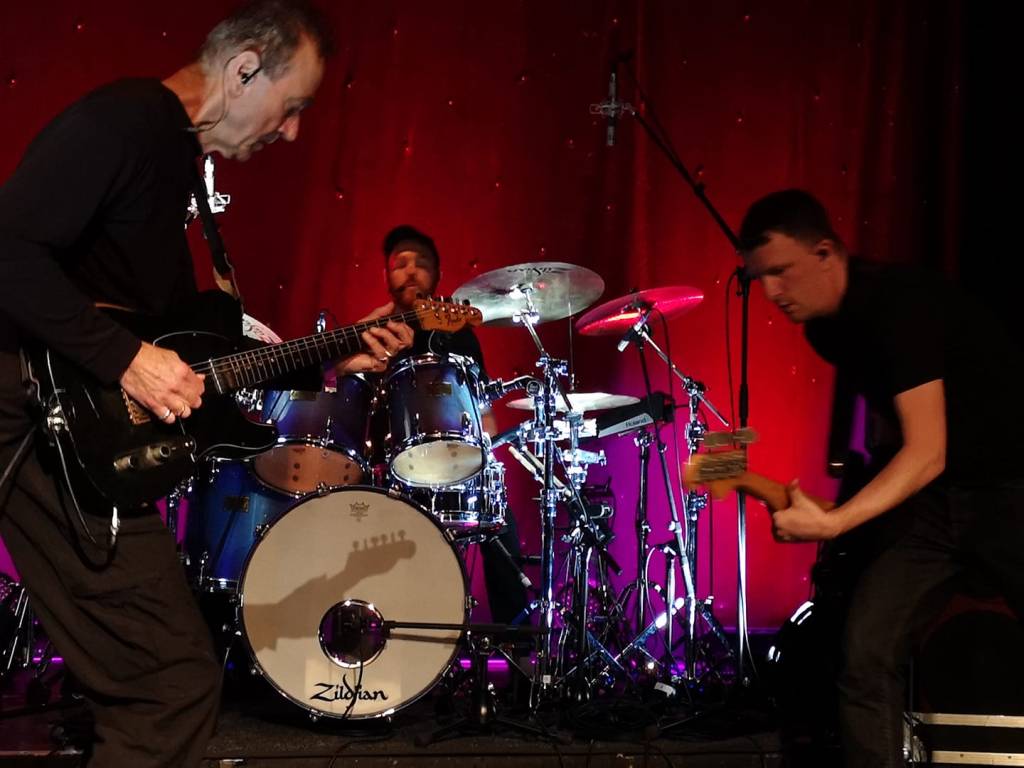
Early May sees the return of former Stranglers frontman Hugh Cornwell to the road for three more UK headline dates, celebrating last October’s acclaimed Moments of Madness LP.
Following a 23-date nationwide tour late last year, he has shows in Birmingham, Manchester and Sheffield along with bandmates Pat Hughes (bass) and Windsor McGilvray (drums), playing two live sets – one of solo years’ material, the other comprising classic Stranglers songs.
As the punk icons’ lead singer and guitarist from 1974 to 1990, Hugh was the main songwriter across 10 Stranglers albums, overseeing 21 top-40 hits and 14 top-20 LPs in the UK alone, before going it alone, having delivered 10 more LPs since.
And Moments of Madness, is considered a high watermark, one of his most significant, attracting praise from the likes of Mojo (‘Cornwell’s still doing things his way and often with striking results.’), Uncut (‘Thunderously tribal garage-rock… the ex-Strangler not yet gone soft.”), Classic Rock (‘the one constant with Hugh Cornwell albums is that they’re never dull’), Record Collector (‘creates a universe where hardcore and newcomer Stranglers fans alike can revel.’) and Louder Than War(‘a call back to his rock roots … a late flowering classic from a man who has always known how to write a damn good tune.’).
Self-produced, and playing all the instruments himself, Moments of Madness finds Hugh flexing his musical muscles with a stripped-down, offbeat, reverberating ‘60s vibe across its 10 tracks, indelibly stamped with Hugh’s trademark imagination and storytelling, the latest long player landing four years after previous high calibre solo offering, Monster.
As the 73-year-old suggests on opening track and first single, ‘Coming Out of the Wilderness’, there are elements here of a hardy veteran tackling the art of survival amid challenging and turbulent times.
This time, his subject matter includes the ‘bewildering trend for tattoos’ (‘Red Rose’), environmental concerns and threats to our ecology (‘Too Much Trash’), and his Mexico-based Italian friends who make the best pasta he’s ever tasted (’Lasagna’), amid more reflective, very personal insights (‘When I Was a Young Man’ and LP closer ‘Heartbreak at Seven’, the first song recorded for the album).
It’s been a tough few years for many of us, and Hugh’s lost some old friends, including former bandmates and co-conspirators Dave Greenfield in May 2020 (‘He was the difference between The Stranglers and every other punk band. His musical skill and gentle nature gave an interesting twist to the band.’), fellow ‘Tele brother’ Wilko Johnson just after the latest LP landed (‘No one could play like Wilko. We’ll all miss him.’), and Jet Black in December (‘We shared a special period of our lives when we strived to become professional musicians. We were immediately drawn to one another, he had a singular sense of purpose that I identified with. He threw everything in his previous life out, to dedicate himself to our common goal. The Stranglers success was founded on his determination and drive. His timing was faultless. All power to him and his legacy.’).

As for the sound, he says, “It’s like I’ve got a stew-pot of sounds where I’ve put in a bit of Joe Meek, a bit of Lou Reed, a flavour of The Doors, a bit of this, a bit of that, and I mix it all up and it tastes good. I’m like a cook when I make records in that I don’t follow any recipe.”
Born and raised in North London, where he played in a band at school with fellow future star, Richard Thompson, Hugh’s degree in biochemistry from university in Bristol led to a postgraduate research role in Sweden in the early ‘70s, where he spent part of his spare time busking in nearby Copenhagen (a cross-border hydrofoil ride away from nearest town, Malmo), ultimately leading to his role in the band Johnny Sox. And when that outfit decamped to England, Jet Black joined and the band got back to basics in Guildford, Surrey, where The Stranglers story proper started in 1974.
While Hugh stuck around for another 16 years, he made an album with Captain Beefheart drummer Robert Williams in 1979, Nosferatu followed nine years later by hisfirst solo offering, Wolf, two years before he called time on The Stranglers.
And since 2012’s rightly acclaimed eighth solo outing, Totem and Taboo, recorded in Chicago and engineered by Steve Albini, we’ve had 2016’s This Time It’s Personal alongside fellow poet laureate of punk contender John Cooper Clarke, giving their own inimitable takes on songs that shaped their youth, and then Monster in 2018, writing about the idols that shaped and influenced his life. And on the evidence of Moments of Madness, he’s clearly still on a creative roll.
Hugh was in West London when I caught up with him, taking a breather amid rehearsals with his bandmates.
“We’ve found a good place here, in Shepherd’s Bush. The boys, Windsor and Pat, both live in Guildford, but we’ve got a system now where they come up to town, which is good.”
The three dates coming up include a Manchester show rescheduled from late November, when a show at Gorilla was cancelled due to an ‘insurmountable technical problem on the part of the venue’, Hugh and his band feeling they ‘did everything they could to try to make the show happen’, apologising on behalf of the venue to ‘everyone who made the effort to get to the show on an evening of travel difficulties and poor weather.’
That date has now switched down the Oxford Road to the Academy 3 on Saturday, May 6th, with all tickets from the Gorilla concert remaining valid.
“It was impossible to play there under the circumstances. You have to put a standard on what you expect people to accept, and what we could have done wouldn’t have been acceptable. I think it would have been substandard. If people are paying the money for the ticket, they deserve a good show, so it’s been rescheduled.”

I see you’ve also got a trip back to Scandinavia lined up, supporting The Undertones again. Are you doing a few dates with them?
“Yeah, we’re also up in Copenhagen. We’ve got about a week of shows.”
It’s been half a century or so since Hugh was living in Sweden, working on a PHD at university in Lund while living the life nearby and building up that live acumen across the water in the Danish capital.
“This is my first trip for a long time. I’m looking forward to it. It should be interesting. I’ll have to brush up my Swedish!”
Funny you should say that. A friend was telling me how he was in Stockholm around 2003 with a friend from London, married to a Swede and fluent in the local lingo. They went into a record shop, finding and buying a copy of ‘Sverige’ (the Swedish language version of Sweden (All Quiet on the Eastern Front)’, released as a single solely in Scandinavia in 1978). He told me the guys in the record shop insisted on playing it before they let him leave, critiquing the quality of your Swedish in a long, long debate in their mother tongue, in what proved to be a listening party with a difference.
“What, saying it wasn’t a good translation?”
I think it was more about your accent and pronunciation in places.
“Ah, well, you can’t win over accents! Ha, how funny.”
I’ll have to find out the address for you.
“Absolutely. I’ll have to go in there. Did he purchase it or not?”
I believe so. I think he was hoping to just buy it, then leave the shop.
“Oh, I see … like a museum exhibit!”
I think so … which – no offence – I suppose you’ve become, in a way.
“Yeah, I have, in a way. Ha!”

I love that track, both versions, and picking up on the English language version and the line, ‘Too much time to think, too little to do,’ how is your boredom threshold these days, would you say?
“Well, I mean, I still have a lower boredom threshold. It doesn’t take much to get me bored. But I manage to fill in with different interests. So I avoid boredom as much as possible. Because boredom is the end of life, really. I mean, you’ve got to avoid getting bored, basically.”
And the music’s keeping you young, I’m thinking. You’re certainly out of the stalls at pace right away on the latest album with ‘Coming out of the Wilderness’, your ‘60s roots to the fore but sounding as current as you ever have.
“Well, thank you. I hope members of the public think that too, so they’ll come along to the shows, because the new stuff sounds good live. It works well. I mean, Pat and Windsor have done very well in interpreting it their own way. And it’s great, I’m really looking forward to playing them again.”
There’s even a little heavy dub on the title track. It sounds like you’re having fun playing bass there.
“Oh, yeah, it was the first time I’ve let myself play bass for many years, and I really enjoyed it. And some of the songs started out from the bass riff, which was interesting. ‘Too Much Trash’ started out from a bass riff, which is a nice way to start songs.”
‘Coming out of the Wilderness’ was already out last time I saw you live, supporting The Undertones at Lytham’s Lowther Pavilion on Lancashire’s Fylde coast, on what proved a great night (with a review here). And that song for me is somewhere between the Rolling Stones, The Troggs, and a few ‘60s UK R&B influences, but there’s also something deeper in there, perhaps a bit of some of those acts that influenced all those outfits, like Howling Wolf or John Lee Hooker.
“Well, great! I mean, why not? I’d be happy for all those to be cited as influences. It’s just, does anyone know what those names mean anymore? That’s the thing.”
Well, they should do. Then again, America was partly oblivious to their own influential acts in those days when the so-called British Invasion came about, not realising where they’d nicked those songs from in the first place, so who knows.
“That’s right. Well, maybe that will happen with me. Maybe they’ll think, ‘Oh, that’s nice,’ and not know where I’ve nicked it from!”
And is there a subtle nod to your early solo outing, Wolf, as well on that song and its accompanying promo video? Only somehow that’s 35 years old now.
“Wow! Yeah, and we’ve revisited Wolf. I got the guys to gen up on ‘Another Kind of Love’, which I’ve always been fond of. And it’s worked really well live. Also, we’ve been looking at resurrecting some of the old Nosferatu songs, and they’re working quite well too. So everything and anything’s possible, you know. If you go back into your back catalogue, you can find ways of playing almost anything.”
I’d say, having caught you live a few times in recent years, you’ve proved that time and again.
“I hope so.”
Will it just be that core trio of yourself, Pat and Windsor on these forthcoming dates?
“That’s right.”
You’ve clearly found a formula there, and you seem so tight as a unit. It works well.
“Yeah, they’re very gifted, and between us we’ve managed to cover the keyboards option, because I don’t want to take keyboards with me on the road. What I’ve discovered is that because they’ve got such great voices, you can actually summon up a lot of the extra instruments from that, which is really nice. And on some of the old Stranglers songs – we can recreate them using the voices to supplement the guitars and bass, so there’s not so much missing as people would imagine.”
Agreed, with a case in point for me – among the tracks that really stood out last time I saw you – alongside several solo era songs, ‘London Lady’, which sounded so fresh at Lytham. And while I never feel comfortable with ‘Five Minutes’, because of the real-life horror story behind it, it’s such a great song live, all these years on.

“Yeah, my manager said, ‘Are you sure you should be playing ‘Five Minutes’ at a festival?’ Because it’s not really family material. But it works so well and it’s so exciting that I think it kind of transcends any of those misgivings. And yeah, I mean, ‘London Lady’, that’s one of the really early Stranglers songs, and in those days we were just a power trio. That was really before Dave Greenfield had stamped his keyboard mark. It’s a song that lends itself to a power trio, so I’m really happy the way that’s worked out.”
Seeing as Moments of Madness is your 10th solo album, were you at all tempted for history to repeat and to call this one 10?
“Ha ha! Well, no, not at all … although there are 10 songs on it!”
Well, there is that as well. And among some extremely positive reviews for this LP, someone in Uncut mentioned your ‘thunderously tribal garage-rock’. That’s not as bad description, really, that nod to garage rock. A couple of songs here wouldn’t have been out of place on the classic Nuggets compilation.
“Great! Well, that’s very good feedback. It’s nice to know it’s working, you know. And I mean, it was actually recorded in a garage … or a building that used to be a garage, so there you go!”
Was it a bit of a lockdown project in that respect?
“It was indeed, yeah.”
Have you now got a taste for self-production, then? Or would you be happy to record with someone else twiddling the knobs next time?
“Well, it’s working. We did Monster there too, and the album with John Cooper Clarke. The last album I actually went somewhere else to record was Totem and Taboo with Steve Albini. Since then, everything’s been working very well. There’s an old maxim which says, ‘If it works, don’t fix it,’ so I see no reason not to continue that. And there’s a progression as well. I mean, I think Moments of Madness sounds better than Monster did. So hopefully, maybe the next one will sound even better. So we’re getting there now!”

And this one’s rather a personal album. A few tracks have that vibe to them.
“Yeah, they are very personal. I mean, it’s a lot of my actual life, and what goes through your mind and stuff, all put down there. So yeah, I’ll plead guilty to that!”
However, despite the content of ‘When I Was a Young Man’ and a couple of other tracks of that lyrical bent, you’re not po-faced. Songs like ‘Lasagna’ suggest the Cornwell humour’s still there.
“Well, ‘Lasagna’ is based on a real experience, you know, and it’s all real stuff. I don’t really have to make anything up. I write about things that happen to me, about real things. There’s not much fantasy in there.”
Were you always happy to be the showman, do you feel?
“Well, when I was in the band that The Stranglers became, in Sweden, Johnny Sox, I was the second guitarist, the sideman who played rhythm guitar and sang backing vocals most of the time. So I started out there, then as time went on, I ended up centre-stage. So it wasn’t always a given. I didn’t always think I was going to be where I ended up.”
That said, one of my abiding memories of the first time I saw The Stranglers, at Guildford Civic Hall in 1982 when I was barely 14, was you telling jokes to the audience while all manner of technological problems were going on with Dave Greenfield’s keyboard. And you still had that warm rapport in the support slot at Lytham four decades later. You’ve always came over as a natural frontman to me.
“Oh, well, why not? If you’ve got people listening to every word, it’s the perfect time to tell a story or a funny happening or something, and just basically make them laugh, you know, and realise that life isn’t that serious and you’ve got to try and enjoy it as you can.”
Good point, well made. And talking of bands who always bring a smile to the face, you’ve played a lot of gigs with The Undertones now. They’re celebrating the 45th anniversary this year of much loved debut single ‘Teenage Kicks’, and this May also marks 45 years since The Stranglers released third studio album, Black and White.

“Oh, well, it makes sense then, and we will be playing the Swedish version of Sweden in Sweden! So that sort of goes along with that thinking, right? And it gives me a good introduction to that song.”
The university town of Lund isn’t so far from Malmo, where one of the dates takes place. Was that where you would get along for a night out back in those days?
“Well, there wasn’t much going on in Malmo in those days! It might have changed now. I shall find out. But you’d go to Malmo to get the ferry across to Copenhagen, and that’s where everything was going on. I could be in Copenhagen in an hour, via Malmo. It was so quick to get over there, and I used to go over there and play in the bars, busking in the bars. I used to do that a lot.”
And as you say, Copenhagen’s also on this itinerary. And you’ve clearly got something of a rapport with The Undertones. You’ve played with them a few times now. It seems to work, the two acts on the same bill.
“Oh definitely, they’re a great bunch of guys. It’s nice. We have good fun.”
As long as he steers clear of trouble this time. According to Hugh’s ex-bandmate JJ Burnel, talking to Dave Simpson for The Guardian in 2014 about the band twice being escorted out of Sweden by armed police, ‘200 members of this teddy boy gang who hated punk drove up in their big 1950s American cars, beat up our road crew and smashed our equipment. We were locked in our dressing room but managed to escape by throwing a few Molotovs before the police arrived.’
On the other occasion, Jet Black (in his own words) ‘kicked up a fracas because I couldn’t get served any food and the hotel threatened to call the police, who turned up with machine guns again to escort us on to the next plane.’
I put this to Hugh, telling him I’m hoping for his sake those notorious Swedish greasers they’d had a few past run-ins with in The Stranglers’ years wouldn’t be out to confront him this time.
“Ha ha! Yeah, I think they were called the raggare. I don’t know if they exist anymore.”
Well, perhaps you’ll find out.
“We’ll find out, yeah!”
Let’s just hope for his sake, any surviving gang members will be on Zimmer frames these days.

For this website’s November 2019 feature/interview with Hugh Cornwell, head here, and for our October 2018 chat, head here. For our November 2015 feature/interview with Hugh, head here, and for our July 2013 feature/interview, head here. You can also check out a July 2014 interview with Jean-Jacques Burnel here, and a March 2015 interview with Baz Warne, fronting the band since 2006, here.
Hugh Cornwell’s forthcoming UK, Irish and Scandinavian dates (*acoustic **supporting The Undertones, who are doing five extra dates in Holland and Germany around their four shows in Sweden and one in Denmark): Belfast Black Box* (Wednesday, April 12th), Dublin Pepper Canister* (Thursday, April 13th), Galway Roisin Dubh* (Friday, April 14th), Cork St Luke’s* (Saturday, April 15th), Uppsala Katalin** (Tuesday, April 25th), Stockholm Slaktkyrkan** (Wednesday, April 26th), Goteborg Pustervik** (Friday, April 28th), Malmo Plan B** (Saturday, April 29th), Copenhagen** (Pumpehuset, Sunday, April 30th), Birmingham O2 Institute 2 (Friday, May 5th); Manchester Academy 3 (Saturday, May 6th); Sheffield O2 Academy 2 (Sunday, May 7th). Hugh and his band will also be appearing at the Mama’s Pride Festival in Geleen, Holland, the second of nine dates in Germany, the Netherlands and Austria that month, leading up to his Melkweg show in Amsterdam on Sunday, May 21st. For details and tickets on all those and more shows in October and next January, head to www.hughcornwell.com and www.thegigcartel.com. You can also keep in touch via Facebook and Twitter.

